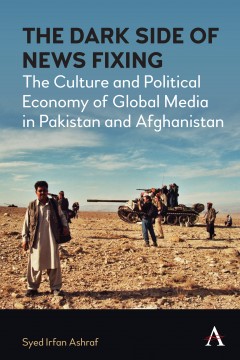The Dark Side of News Fixing
The Culture and Political Economy of Global Media in Pakistan and Afghanistan
By Syed Irfan Ashraf
Other Formats Available:
- About This Book
- Reviews
- Author Information
- Series
- Table of Contents
- Links
- Podcasts
About This Book
The book argues that the definition of a “fixer” emerges when local journalists are de-professionalized and their field expertise and connections are stripped away to produce a faceless, nameless, set of “eyes and ears” in service of the 24/7 media machine. The fact that we have the same news 24/7 across a range of news channels is an outcome of the simultaneous process of centralized decentralization—media conglomerates controlling news distribution and exhibition by hiring a scattering of fixers to do the groundwork of global news production. But working as a daily wager in journalism is not about risks taken or the self-exploitation endured. Rather, the role is an attack on the basics of the profession itself, the basic dignity of the journalist as an upholder of democracy. A fixer, who must be the eyes and ears of the people against forces of status quo, is reduced to a role and given as an instrument in regular journalists’ hands to be used as a resource. Challenging existing literature on the topic, the book reveals the tension between actual local reporters and the role (read fixer) they are hired to fill. The book argues that fixer as a role emerges in tandem with news practices that leads to decontextualizing local events, people and stories to fit the consumption patterns of market economy, a colonial practice resurging in contemporary capitalism.
The book holds not just the hierarchies in journalism responsible for feeding the dark underbelly of global news production, but also identifies the field inequality that produces violence against those local reporters. The issue is a quite serious challenge. Offering on-the-ground view of the situation from local perspectives, the book examines the consequences of the political economy of corporate media, and the price journalists pay for diminishing the life expectations as well as intellectual labor of journalists working as “fixers.”
This book is unique in that it studies fixers not as a role but rather as a political position, objective condition and subjective experience. Theorizing on the emergence of the fixer as an outcome of colonial capitalism, the book brings Marx, himself a journalist, back into the twenty-first century discourse—taking discussions of intellectual labor back to the origins of capitalism—revealing how structural inequality takes a toll on journalism as a profession. As U.S. Senator Hiram Warren Johnson once declared that the first casualty of war was truth, the book suggests that the sacrifice of truth has become a routine, both in liberal democracies and in the war-torn Global South. The first casualty, in this reckoning, is not truth itself, but the bearers of truth, i.e., journalists, many of whom now find themselves reduced to the category of fixers.
Reviews
“Ashraf penetratingly explores the mesh of global journalistic hierarchies, capitalism and neo-imperialism in one of the world’s most dangerous war zones – the historically fractious Pashtun Belt straddling Pakistan and Afghanistan. Readers concerned with the politics of intellectual labor in war reporting should grasp this book for its fresh analyses and grounded information” — John D.H. Downing, Chief Editor, Sage Handbook of Media Studies.
“Reporting from FATA-Afghanistan-Pakistan, the ground zero of news production today – where imperialism, capitalism, and religious fundamentalism collude to constantly displace people from their homes and lives – Syed Irfan Ashraf reveals how the ubiquitous ‘fixer’ is not just another professional category in journalism, but its nadir. From his own experience as a ‘fixer’, Ashraf shows how the global media capitalist machine literally feeds on the life and work of local journalists, mutilating them into its ‘eyes and ears’, and the terrible costs extracted in return for the fundamental human desire to be seen and heard; to speak back to an international public and not just be its victim or other. Thinking like Marx, Ashraf explains how the ‘fixer’ is a role, imposed by the process of the proletarianization; and its dehumanizing consequences, not only for journalists, but society as a whole — Jyotsna Kapur, Professor, Cinema and Media Studies, Southern Illinois University, US.
The monograph, thanks to its empirical richness, is a valuable and unique contribution to the fast-growing volume of literature on fixers. The author, albeit briefly, looks into the previously unexplored intensity of fixers’ emotional experience. Their affective proximity to the events they cover made the local journalists’ labor more painful and traumatic but also motivated them, including the author himself, “to connect worries of the Pashtun community (...) to wider audiences to highlight the global violence” (p. 31). Ashraf vividly depicts the complexity of the conflict reporting ecosystem: the murky settings, the fabric of which is made by chains and nets of mutual exploitation—Mass Communication and Society
Author Information
Irfan Ashraf has a PhD in mass communication and media arts (MCMA) from the Southern Illinois University, Carbondale and is an assistant professor at the Department of Journalism and Mass Communication, University of Peshawar, Pakistan.
Series
Anthem Global Media and Communication Studies
Table of Contents
List of Figures; About the Author; Acknowledgments; Introduction; Chapter One Laying Bare the Malala Story: Some Tough and Painful Reflections on the “Fixer” Role; Chapter Two The “Fixer”: Journalism’s Dark Secret; Chapter Three Pashtuns as Potential “Fixers”: News Work in a State of War; Chapter Four The Afghan Beat: Journalism as War; Chapter Five The “Fixer”: Local Labor, Global Media; Chapter Six Buying Low, Selling High: The Hunt for Bin Laden; Chapter Seven Impunity: The New Normal; Chapter Eight Reporting with Marx; Appendix; Notes; Bibliography; Index.
Links
Stay Updated
Information
Latest Tweets



